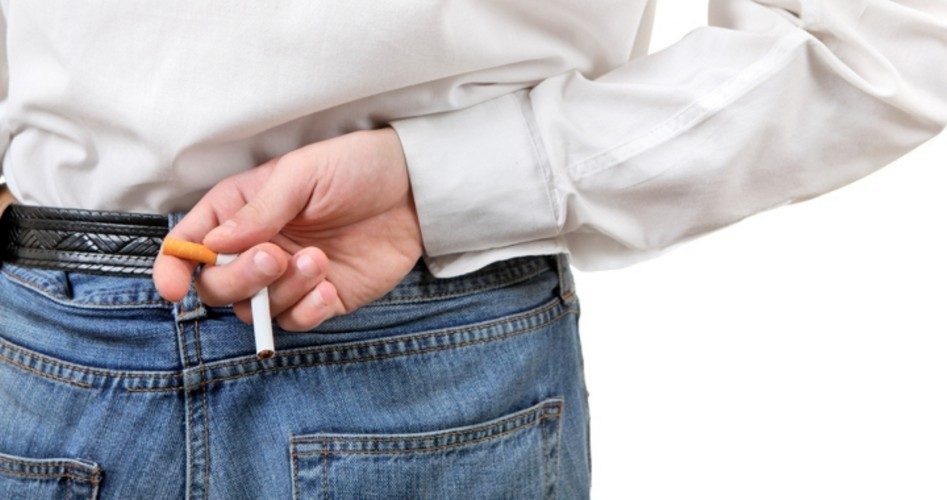
Podcast: Play in new window | Download ()
Subscribe: Android | RSS | More
In New York, once found to be the least free state, politicians are working overtime trying to make ex-NYC mayor Michael Bloomberg’s ill-fated large soda ban seem the norm. The latest example is a proposal in Long Island’s Suffolk County to ban smoking “in apartment complexes, condominiums, and multi-family dwellings,” writes CBS New York, with violators facing up to a $1,000 fine.
“Smoking is already banned in many public places, and near schools and office buildings,” the site continues. But that’s not enough. In fact, CBS informs that there are two proposed laws to “reduce” second-hand smoke in Suffolk.
“‘Let me be clear, any legislation that there is a vote required that would have an impact on preventing the public or innocent people who have made a choice not to smoke, from being exposed to smoke, I will support that legislation,’ Suffolk Legislator Dr. William Spencer said,” CBS also tells us.
“Spencer, who is also a medical doctor, said secondhand smoke can permeate through cracks in walls, electrical lines, plumbing, and ventilation systems.”
Plumbing? Seriously?
For the record, I was raised in a home with enough second-hand smoke so that it sometimes seemed like London in December. Most of the family didn’t like the odor, and still doesn’t, and it did cause some friction. But I don’t remember ever detecting smoke upstairs (the tobacco appreciation occurred downstairs) — and I lived in a very, very old, poorly insulated home.
So what is Spencer’s game talking about cracks and plumbing? Is he trying to get this down to the molecular level? Are these toxicity microaggressions? A proscription based on reverse homeopathy? A subliminal-influence theory relating to the physical world?
Even if one does consider second-hand smoke dangerous (note: “Study Finds No Link Between Secondhand Smoke And Cancer”), there’s a toxicological principle informing, “The dose makes the poison.” Even H2O is dangerous at a certain level, which is why a woman some years ago died of water toxicity competing in a radio show contest. On the other hand, the government allows a certain small amount of arsenic — a known “poison” — to be in our water. Given this, is at all tenable claiming that cigarette smoke that’s imperceptible or almost so threatens health?
The legislator proposing to ban smoking in private dwellings is Sam Gonzalez (D-9th Legislative District). When asked, he denied he was going too far and stated, “We’re heading in that direction anyway,” referring to already existing anti-smoking laws. Of course, this reasoning could be used to justify anything that’s a fashion even if it’s a fallacy.
Gonzalez responded to those saying he couldn’t stop them from smoking with (a perhaps defiant?) “Why not?” Now, without giving a reason that might have been Founding Father approved — and not so beneficial to Mr. Gonzalez’s health — let’s further examine the logic of this nanny-statism.
If you can’t smoke in your dwelling, why can you burn incense or indulge a smoke-creating hobby there? For that matter, why can you barbecue but not smoke in NY’s parks? And what of the cars, trucks, and industries spewing toxins into the air?
This isn’t to draw a direct equivalence between all these things; some are more unhealthful than others. But where and how do you draw the line? In answering, a word comes to mind here: prejudice.
Smoking has long been under assault because it’s unfashionable, politically incorrect. It’s not a “woke” habit such as using pot, a substance which, do note, gets much friendlier establishment media treatment.
So in this relativistic time in which taste trumps Truth (which is denied), some might say that leftists define “a bad idea that should be outlawed” thus: “something I have neither an affinity for nor tolerance of.”
As for the Suffolk flight from sanity, it has nothing on its neighboring county, Nassau. In 2011, legislators there proposed banning smoking in cars when minors are present, with, again, a $1,000 fine suggested. The same law was proposed that year statewide and already existed in NY’s Rockland County and, in some form, in four states (as of 2011).
Yet again, a certain question suggests itself: If the above is a good idea and government’s role, should people be allowed to feed their kids generous amounts of fat, sugar, or salt? After all, eating junk food with some regularity is certainly more unhealthful than second-hand smoke.
If you think I’m giving statists ideas, know they’ve already had them: Governments have proposed fining parents of obese children. This, not to mention the proposed/already-existing taxes on fat, sugar, meat, and soft drinks that, well, reflect how the statists care about you so very, very much. Besides, in this secular time in which soul and sin are scoffed at, the Cult of the Body will not tolerate heresy.
As for those believing these nanny-staters do actually mean well, perhaps they should ponder an observation by philosopher C.S. Lewis. “Of all tyrannies, a tyranny sincerely exercised for the good of its victims may be the most oppressive,” he wrote. “It would be better to live under robber barons than under omnipotent moral busybodies. The robber baron’s cruelty may sometimes sleep, his cupidity may at some point be satiated; but those who torment us for our own good will torment us without end for they do so with the approval of their own conscience.”
Self-righteous sinners with redwood-size beams in their eyes make for dangerous would-be saints.
Photo: shadrin_andrey/iStock/Getty Images Plus
Selwyn Duke (@SelwynDuke) has written for The New American for more than a decade. He has also written for The Hill, Observer, The American Conservative, WorldNetDaily, American Thinker, and many other print and online publications. In addition, he has contributed to college textbooks published by Gale-Cengage Learning, has appeared on television, and is a frequent guest on radio.



